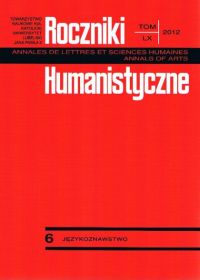Selected Remarks on the Syntactic Aspect of Paterykon by Sylwester Kossow (1635)
Abstract
The paper discusses a selection of issues relating to the syntactic structure of Paterykon, as translated by Sylwester Kossow. These observations are put in the context of the specialist literature devoted to the status of the Polish language in the 17th century, including its Borderland dialectal varieties.
The analysis focuses on the following syntactic structures: causal constructions – with preposition, with infinitive (modelled on the Latin n.c.i and a.c.i. constructions), syntax of negative sentence constructions (single negation after the conjunction ani [either]), syntax of quotes (a merger of reported and direct speech constructions), numerals, and the semantics of the subordinators (iż [that], jeśli [if], skoro [if/unless]). A more important part of the analysis concerns the use of grammatical tenses in the text. The analysis shows that tenses are not always ordered logically in the complement sentences with the adverbial of time as well in the complex complement sentences (the present tense expresses an action taking place prior to the one signalled by the perfect tense).
The examination helps to discover the systemic parallelism between the analysed text and the 17th-century Northern Borderland Polish language variety. At the same time, by pointing out to the systemic discrepancies between the text and the above-mentioned language variety, the author indicates that Paterykon should be classified as representative of a regional variety of Polish.
References
Grappin H.: O pewnym staropolskim typie użycia czasu teraźniejszego (przyszedł, a oni śpią), „Język Polski” 1957, z. 5, s. 329-343.
Klemensiewicz Z.: [Uwagi do artykułu H. Grappina], „Język Polski” 1957, z. 5, s. 343-346.
Klemensiewicz Z.: Historia języka polskiego, Warszawa 1999.
Klimek J.: Konstrukcja accusativus cum infinitivo w XVII-wiecznych polonikach kijowskich, w: Problemy językoznawstwa współczesnego i historycznego, „Poznańskie Spotkania Językoznawcze” 21(2010), s. 61-75.
Klimek J.: Status polszczyzny kijowskiej w świetle granic i zasięgu polszczyzny kresowej, w: Żywe problemy historii języka, red. M. Kuźmicki, M. Osiewicz, Poznań 2010, s. 179-191.
Kurzowa Z.: Język polski Wileńszczyzny i Kresów północno-wschodnich XVI-XX w., Kraków 2006.
Moszyńska D.: O polszczyźnie Sylwestra Kossowa (Na podstawie wstępu do Pateryka Pieczarskiego z 1635 roku), w: Tematy. Księga jubileuszowa w 70. rocznicę urodzin Profesora Leszka Moszyńskiego, red. H. Wątróbska, K. Szcześniak, Gdańsk 1998, s. 138-143.
Pisarkowa H.: Historia składni języka polskiego, Wrocław 1984.
Rieger J.: Kilka uwag o polszczyźnie pisarzy-Rusinów w XVII w., w: Der Text und seine Spielarten im polnischen Barok. Bausteine zu einer Epochensynthese, her. H. Schmid, München 2005, p. 197-208.
Siuciak M.: Kształtowanie się kategorii gramatycznej liczebnika w języku polskim, Katowice 2008.
Smolińska B.: Polszczyzna północnokresowa z przełomu XVII i XVIII w., Wrocław 1983.
Stylistyczna akomodacja systemu gramatycznego, red. T. Skubalanka, Wrocław 1988.
Szober S.: Użycie form czasu przyszłego w opowiadaniu historycznem na oznaczenie czynności minionych, „Język Polski” 1921, z. 2, s. 33-41.
Zapomniane konstrukcje składni średniopolskiej (XVII wiek). Wybór przykładów, oprac. A. Kałkowska, K. Pisarkowa, J. Twardzikowa, Wrocław 1972.
Copyright (c) 2012 Roczniki Humanistyczne

This work is licensed under a Creative Commons Attribution-NonCommercial-NoDerivatives 4.0 International License.





